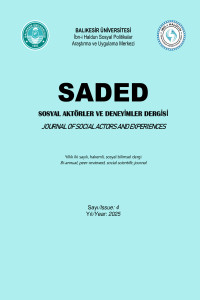Abstract
In history, every turning point in societies based on the economic basis has created exaggerated reflections in social phenomena and art. Creativity always progresses by evolving the renewed conditions, and it can be said that no creative process is purely personal.
In this study, the opera La Traviata, composed by Verdi and first performed in 1853, was examined by literature scanning method and it was concluded that the branch of opera art is highly sensitive in terms of the interaction of artistic creations with the historical and economic processes of society, with the contribution of providing a wealth of space for elements such as music, literature and visual arts that it contains.
References
- Say, A. (1997). Müzik tarihi. İstanbul: Müzik Ansiklopedisi Yayınları.
- Dumas, A. (1959). Kamelyalı kadın. (Çev. Z. Güvemli). İstanbul: Güven Basım Yayınevi.
- Altar, C. M. (2000). Opera tarihi. İstanbul: Pan Yayıncılık.
- Şatır, S. (1998). Operada gerçekçilik. İstanbul: Pan Yayıncılık.
- Yener, F. (1992). 100 opera. İstanbul: Bateş Yayınları.
Abstract
Tarihte, toplumlarda ekonomik temelde oluşan her dönüm noktası, sosyal olgularda ve sanatta abartılı yansımalar oluşturmuştur. Yaratıcılık her zaman yenilenen koşulları evirerek ilerler ve hiçbir yaratım sürecinin salt kişisel olmadığı söylenebilir.
Bu çalışmada, Verdi’nin bestelemiş olduğu, ilk kez 1853 yılında sahnelenmiş olan La Traviata operası, literatür tarama yöntemiyle incelenerek, opera sanat dalının içerdiği müzik, edebiyat, görsel sanatlar gibi ögelerin alan zenginliği sağlamasının katkısıyla, sanatsal yaratımların toplumun tarihsel ve ekonomik süreçleri ile etkileşimi bakımından oldukça duyarlı olduğu sonucuna varılmıştır.
References
- Say, A. (1997). Müzik tarihi. İstanbul: Müzik Ansiklopedisi Yayınları.
- Dumas, A. (1959). Kamelyalı kadın. (Çev. Z. Güvemli). İstanbul: Güven Basım Yayınevi.
- Altar, C. M. (2000). Opera tarihi. İstanbul: Pan Yayıncılık.
- Şatır, S. (1998). Operada gerçekçilik. İstanbul: Pan Yayıncılık.
- Yener, F. (1992). 100 opera. İstanbul: Bateş Yayınları.
Details
| Primary Language | Turkish |
|---|---|
| Subjects | Anthropology of Music |
| Journal Section | Research Article |
| Authors | |
| Early Pub Date | June 24, 2025 |
| Publication Date | June 30, 2025 |
| Submission Date | February 6, 2025 |
| Acceptance Date | April 14, 2025 |
| Published in Issue | Year 2025 Issue: 4 |
Creative Commons
Bu derginin içeriği https://creativecommons.org/licenses/by-nc/4.0/ altında lisanslanmıştır.
Content of this journal is licensed under https://creativecommons.org/licenses/by-nc/4.0/


